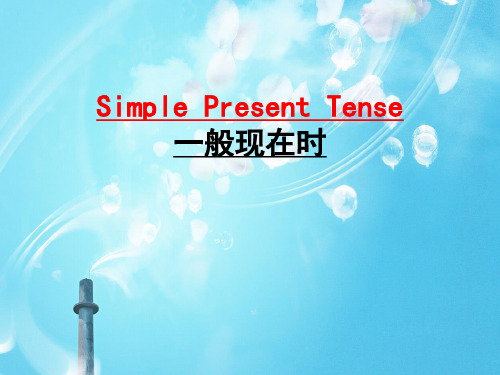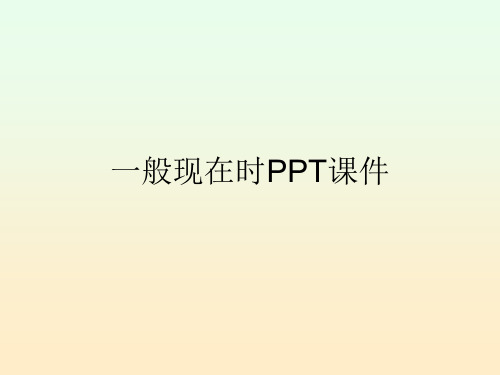一般现在时PPT优秀课件
合集下载
《一般现在时》PPT课件

一、Language focus 描述发展趋势——名词、动词、形、副、 现在完成时 连接词but 和so 描述家庭生活和关系 二、描述发展趋势——名、动、形、副 1. 描述发展趋势——名、动、形、副可观课 本 Activity 1 P38
n. A rise An increase
V. to go up to increase to rise V. to decline to decrease to go down to fall
}
Exercise:
Activity 5 Workbook Activity 7
5.复习一般过去时 一般过去时常用于表示过去某一时间或过去一段时期内发生的事件 或动作 When I was little girl, my brothers and I collected stamps for many years. 6.复习过去进行时 过去进行时表示用于描述过去某一时刻或过去某阶段正在进行的动作 As we burst in, my mother was standing behind the counter. When we were having lunch, my mother told us an interesting story. 7.一般过去时和过去进行时的疑问句形式 疑问句+did+主+V原+...? 疑问句+was+主+Ving+…..? What were you doing last night? When did she leave ? Exercise : Activity 12 . 13
3.复习现在进行时 构成:be + v. ing 用法:现在进行时用于表示现正在发生蔌 现阶段正在进行的动作。 He is listening to the radio. I am watching TV. 状态动词不用于进行时态。 复习否定式和疑问式再举例。 P4
n. A rise An increase
V. to go up to increase to rise V. to decline to decrease to go down to fall
}
Exercise:
Activity 5 Workbook Activity 7
5.复习一般过去时 一般过去时常用于表示过去某一时间或过去一段时期内发生的事件 或动作 When I was little girl, my brothers and I collected stamps for many years. 6.复习过去进行时 过去进行时表示用于描述过去某一时刻或过去某阶段正在进行的动作 As we burst in, my mother was standing behind the counter. When we were having lunch, my mother told us an interesting story. 7.一般过去时和过去进行时的疑问句形式 疑问句+did+主+V原+...? 疑问句+was+主+Ving+…..? What were you doing last night? When did she leave ? Exercise : Activity 12 . 13
3.复习现在进行时 构成:be + v. ing 用法:现在进行时用于表示现正在发生蔌 现阶段正在进行的动作。 He is listening to the radio. I am watching TV. 状态动词不用于进行时态。 复习否定式和疑问式再举例。 P4
英语时态8种基本时态讲解.ppt课件

4)动词过去式变化规则。 a)一般情况下的词加-ed. work---worked call----called b)以不发音的字母e结尾的单词直接加-d . live----lived change----changed smoke----smoked die----died graduate----graduated drive----drove
8.过去完成时 表示动作发生在过去某一时间之前已经完成的动作或状态, 强调“过去的过去”, 常与 by the time, by the end of…,before , by 等引导时间的状语连用。
基本结构 主语+ had + 动词过去分词 + 其他成分 When I got to the cinema yesterday the film had begun already. He had learned English before he came here.
现在完成时与一般过去时的区别: 1)现在完成时侧重于对现在的影响;而一般过去时侧重于某一动作发生在过去某个时间或某段时间。即现在完成时侧重于现在的结果,而一般过去时侧重于动作发生的时间。例如:
I have seen the film. 我看过这部电影。(现在我仍记得电影的内容) I saw the film three days ago. 三天前我看了这部电影。(强调是三天前,而不是别的什么时候看的电影)
be going to含有“打算,准备”的意思,而will则没有这个意思, She is going to lend us her book. He will be here in half an hour.
be about to+V.原形(意为马上做某事,在时间上指最近的将来) I am about to leave school. 不能与表示时间的副词连用。 They are about to set out.(√) They are about to set,变y为i加-ed. study----studied carry----carried cry----cried try----tried d)以元音字母+y结尾的单词直接加-ed. play----played stay----stayed
8.过去完成时 表示动作发生在过去某一时间之前已经完成的动作或状态, 强调“过去的过去”, 常与 by the time, by the end of…,before , by 等引导时间的状语连用。
基本结构 主语+ had + 动词过去分词 + 其他成分 When I got to the cinema yesterday the film had begun already. He had learned English before he came here.
现在完成时与一般过去时的区别: 1)现在完成时侧重于对现在的影响;而一般过去时侧重于某一动作发生在过去某个时间或某段时间。即现在完成时侧重于现在的结果,而一般过去时侧重于动作发生的时间。例如:
I have seen the film. 我看过这部电影。(现在我仍记得电影的内容) I saw the film three days ago. 三天前我看了这部电影。(强调是三天前,而不是别的什么时候看的电影)
be going to含有“打算,准备”的意思,而will则没有这个意思, She is going to lend us her book. He will be here in half an hour.
be about to+V.原形(意为马上做某事,在时间上指最近的将来) I am about to leave school. 不能与表示时间的副词连用。 They are about to set out.(√) They are about to set,变y为i加-ed. study----studied carry----carried cry----cried try----tried d)以元音字母+y结尾的单词直接加-ed. play----played stay----stayed
一般现在时ppt课件完整版

不可数名词作主语时,谓语动词用单数 形式。
可数名词单数作主语时,谓语动词也用 单数形式。
例如:Water is essential for life.(水 对生命至关重要。)/ A book is on the table.(一本书在桌子上。)
例外情况总结
当主语为并列主语时,谓语动词的数要与靠近它的主语保持一致。
练习3答案
reads。解析:主语 She 是第三人称单数 ,且时间状语为 on weekends,表示经 常性动作,所以谓语动词要用单数形式 reads。
THANKS
时间状语分类及举例
表示经常性或习惯性的动作
always, usually, often, sometimes
表示现在的状态或特征
now, at present, these days
表示普遍真理或客观事实
in general, as a rule
频率副词分类及举例
01
高频副词
always, constantly, continually
注意区分完全否定和部分否定。完全 否定表示全部否定,而部分否定表示 部分否定。例如,“None of the students passed the exam.”(没 有一个学生通过了考试)是完全否定 ;“Not all of the students passed the exam.”(并非所有学生都通过 了考试)是部分否定。
does he work?等。
动词短语和情态动词的变化规则
03
动词短语中的动词和情态动词后接动词原形,如I can swim,
they often go out等。
02 肯定句结构与用法
主语+动词原形+其他成分
(完整版)一般现在时课件SimplePresentTense

10
Complete the sentences. Use the proper verb forms in brackets
1. Jordan __p_la_y_s__(play) basketball. He d__o_es_n_’_t_p_l_a_y_(not play) football.
哪些词是第三人称单数(三单)?
5、不定代词someone, nobody,everyone, everything, something作主语可以看作是 第三人称单数。
Everyone is here. 大家到齐了。
6、当数字或字母作主语时,看作第三人称单数。
“6” is a lucky number. “6”是个吉利数字。 “A” is a letter . A是个字母。
No,it isn’t.
be + 主语 + 其它部分?
肯定回答:Yes,主语+be
否定回答:No,主语+be+not
注意:在回答时,主语要用相应的代词代替
2、Can you speak English ?
情态动词 主语 动词原形 其他部分
Yes,I can.
No,I can’t.
情态动词 + 主语 + 动词原形 + 其它部分?
8
否定句的构成
These boys like playing football. These boys don’t(do not)like playing football.
The girl reads English every day. The girl doesn’t(does not)read English every day.
Complete the sentences. Use the proper verb forms in brackets
1. Jordan __p_la_y_s__(play) basketball. He d__o_es_n_’_t_p_l_a_y_(not play) football.
哪些词是第三人称单数(三单)?
5、不定代词someone, nobody,everyone, everything, something作主语可以看作是 第三人称单数。
Everyone is here. 大家到齐了。
6、当数字或字母作主语时,看作第三人称单数。
“6” is a lucky number. “6”是个吉利数字。 “A” is a letter . A是个字母。
No,it isn’t.
be + 主语 + 其它部分?
肯定回答:Yes,主语+be
否定回答:No,主语+be+not
注意:在回答时,主语要用相应的代词代替
2、Can you speak English ?
情态动词 主语 动词原形 其他部分
Yes,I can.
No,I can’t.
情态动词 + 主语 + 动词原形 + 其它部分?
8
否定句的构成
These boys like playing football. These boys don’t(do not)like playing football.
The girl reads English every day. The girl doesn’t(does not)read English every day.
(完整版)一般现在时PPT课件.ppt

7. Tom can not walk fast because he _c_a_r_r_ie_s(carry) a heavy box.
用动词的适当形式填空
1.She ____(go) to school at eight o’clock.
2. He usually _____ up at 17:00.(get )
直接加s
Fly-flies;ห้องสมุดไป่ตู้stay-stays
• 第三节 • 特殊疑问句
• I clean the window at home on Saturdays.
• 1、对主语提问:
• Who cleans the window at home on Saturdays?
• 2、对宾语提问:
Has David got a goal?
7. We have four lessons.(否定句) We don’t have four lessons.
8. Nancy doesn’t run fast (肯定句)
Nancy runs fast. 9. My dog runs fast. 否定句:My dog doesn’t run fast.
5. Danny_s_t_u_d_ie_s__(study) English, Chinese, Maths, Science and Art at school.
6. Mike sometimes g_o__e_s_(go) to the park with his sister.
7. At eight at night, she w__a_tc_hes (watch) TV with his parents. 8. _D_o_e_s_ Mike r_e_a_d_(read) English every day?
初中英语语法之 一般现在时 PPT课件 图文

2.用括号内动词的适当形式填空。 1. We often_______(play) in the playground. 2. He _______(get) up at six o’clock. 3.____you______(brush) your teeth every morning. 4. What______ (do) he usually____ (do) after school? 5.Danny_______(study)English, Chinese, Maths, Science and Art at school.
How old _a_r_eyou? Where a_r_e_ they ?
小结:be 动词的一般现在时的句式: 肯定句:主语+be+表语(n., adj.等)
否定句:主语+be+ not+表语.
一般疑问句:Be+主语+表语?
特殊疑问句:疑问词+be+主语?
2.实义动词的一般现在时句式: 肯定句: 主语(非三单)+v.原形+其他. 1) I _s_ta_y___ (stay) at home on Saturdays. 2) They h__a_v_e_ (have) sports every day. 3) My parents _g_iv_e_(give) me ten yuan
What _d_o_e_s_ she_w_a_n_t_ (want)? What time _d_o_you_h_a_v_e_ (have) lunch? What time d_o_e_s_she_h_a_v_e(have) lunch?
What _d_o__ you _d_o_(do)? What _d_o_e_s__ she _d_o__(do)? How __d_o_ you_sp__el_l (spell) it? How _d_o_e_s_ he s_p_e_l_l _(spell) it?
一般现在时态ppt课件.ppt

10
当主语不是第三人称单数时 :
I get up at 6:35 in the morning.
否定句:
I do not (don't) get up at 6:35 in the morning.
一般疑问句: 肯定回答: 否定回答:
Do you get up at 6:35 in the morning? Yes, I do.
主系表
4. They are from China.
5. Jim is under the tree.
6. My English teacher is kind, but sometimes he is strict.
3
单句改错
? 1. They are come from Canada. (A去掉are或come)
? 1. I _a_m__ a teacher. ? 2. Mary __i_s_ my friend. ? 3. We _a_r_e_ under the tree. ? 4. They _a_re__ swimming in the river. ? 5. _I_s _ he your cousin? ? 6. Jim and I _a_r_e _ from the UK. ? 7. _A_r_e_ you Jim's parents? ? 8. My mother __is__ beautiful.
B
C
(A改为Does)
? 5. We like watch TV in the evening. (B改为watching TV)
?
A
B
C
4
一般现在时:
表示现在的状态、经常的或习惯性的动作、表示主语 具备的性格和能力等。 时间 状语有:always, usually, often , sometimes, never, every day, on Mondays/ Sundays 等。 一般现在时的构成: 肯定句:
当主语不是第三人称单数时 :
I get up at 6:35 in the morning.
否定句:
I do not (don't) get up at 6:35 in the morning.
一般疑问句: 肯定回答: 否定回答:
Do you get up at 6:35 in the morning? Yes, I do.
主系表
4. They are from China.
5. Jim is under the tree.
6. My English teacher is kind, but sometimes he is strict.
3
单句改错
? 1. They are come from Canada. (A去掉are或come)
? 1. I _a_m__ a teacher. ? 2. Mary __i_s_ my friend. ? 3. We _a_r_e_ under the tree. ? 4. They _a_re__ swimming in the river. ? 5. _I_s _ he your cousin? ? 6. Jim and I _a_r_e _ from the UK. ? 7. _A_r_e_ you Jim's parents? ? 8. My mother __is__ beautiful.
B
C
(A改为Does)
? 5. We like watch TV in the evening. (B改为watching TV)
?
A
B
C
4
一般现在时:
表示现在的状态、经常的或习惯性的动作、表示主语 具备的性格和能力等。 时间 状语有:always, usually, often , sometimes, never, every day, on Mondays/ Sundays 等。 一般现在时的构成: 肯定句:
一般现在时现在进行时和一般过去时和一般将来时态ppt(共26张PPT)

• e.g. I was born in 1980. • I was not born in 1980.
• Were you born in 1980?
第二种 含有行为动词的
• 肯定结构
• 主语+行为动词(过去式)+其它 否定结构
主语+didn’t+行为动词(原形)+其
它 一般疑问句结构
Did+主语+行为动词(原形)+其它?
看来将要发生的事或存在的状态。
• 肯定句:主语+ will+动词原形------
• There will be a computer on every desk in the future.
• 未来每个桌子上都将有一台电脑。 • It will rain tomorrow. 明天将要下雨。 • We will go to school on foot.
• 我们将步行去上学。
• 特殊疑问句:疑问词+一般疑问句?
• 一般将来时II: is/am /are going to + 动词原形的
用法。
• 1、主要用来表示打算或计划要做某事, 主语是人。
如: • She is going to learn Japanese next year. • There is going to be a football match tonight. • Dad and I are going to see Beijing opera this
未来每个桌子上都将有一台电脑。 今天下午我和爸爸打算去看京剧。
swim
chat
第二种 含有行为动词的
I am going to go swimming tomorrow(明天).
2.主语为非第三人称单数的情况
• Were you born in 1980?
第二种 含有行为动词的
• 肯定结构
• 主语+行为动词(过去式)+其它 否定结构
主语+didn’t+行为动词(原形)+其
它 一般疑问句结构
Did+主语+行为动词(原形)+其它?
看来将要发生的事或存在的状态。
• 肯定句:主语+ will+动词原形------
• There will be a computer on every desk in the future.
• 未来每个桌子上都将有一台电脑。 • It will rain tomorrow. 明天将要下雨。 • We will go to school on foot.
• 我们将步行去上学。
• 特殊疑问句:疑问词+一般疑问句?
• 一般将来时II: is/am /are going to + 动词原形的
用法。
• 1、主要用来表示打算或计划要做某事, 主语是人。
如: • She is going to learn Japanese next year. • There is going to be a football match tonight. • Dad and I are going to see Beijing opera this
未来每个桌子上都将有一台电脑。 今天下午我和爸爸打算去看京剧。
swim
chat
第二种 含有行为动词的
I am going to go swimming tomorrow(明天).
2.主语为非第三人称单数的情况
初中英语一般现在时学习课件(共25张ppt)

Watch TV
I often ( ) TV at 8:00.
my father and I go swimming every sunday
My father and I ( ) swimming every Sunday
we play football every Wednesday
We ( ) football every Wednesday.
•9、要学生做的事,教职员躬亲共做;要学生学的知识,教职员躬亲共学;要学生守的规则,教职员躬亲共守。2021/8/312021/8/31Tuesday, August 31, 2021 •10、阅读一切好书如同和过去最杰出的人谈话。2021/8/312021/8/312021/8/318/31/2021 7:50:25 AM •11、只有让学生不把全部时间都用在学习上,而留下许多自由支配的时间,他才能顺利地学习……(这)是教育过程的逻辑。2021/8/312021/8/312021/8/31Aug-2131-Aug-21 •12、要记住,你不仅是教课的教师,也是学生的教育者,生活的导师和道德的引路人。2021/8/312021/8/312021/8/31Tuesday, August 31, 2021
• You have to believe in yourself. That's the secret of success. 人必须相信自己,这是成功的秘诀。
•
Exercise
• 8.I ( ) a boy. • 9.You ( ) a girl. • 10.He ( ) a teacher.
Homework(家庭作业)
1.将所学内容重新看一遍。 2.当一回小老师,给爸爸妈妈讲解什 么是一般现在时。Fra bibliotek是辅音字母
一般现在时课件ppt

05
一般现在时的练习与巩固
填空练习
总结词
填空练习是巩固一般现在时的一种有效方法,通过填空的情 势,让学生填写正确的动词情势,加深对时态的理解和应用 。
详细描写
在填空练习中,教师可设计一些句子,有意留出空白,让学 生根据上下文语境和时态要求填写正确的动词情势。例如, “I ___(play) basketball every XXXday.”,学生应填写 “play”。
结构
一般现在时的基本结构是 “主语 + 动词 + 宾语” 。
情势
动词采取一般现在时情势 ,即动词原型或第三人称 单数情势。
一般现在时的特点
普遍性
一般现在时适用于描写普 遍存在的现象、事实或习 惯性动作。
客观性
一般现在时强调动作或状 态的客观存在,不受时间 限制。
习惯性
一般现在时用于描写习惯 性、规律性的动作或状态 。
一般现在时的用法
描写现在的动作和状态
描写普遍存在的现象和事实
如“I eat an apple every day.”(我每天 吃一个苹果。)
如“The XXX rises in the east.”(太阳从 东方升起。)
描写习惯性、规律性的动作
如“She goes to work by bus every day.”(她每天乘公交车上班。)
翻译练习
总结词
翻译练习是一种跨语言的练习方式,通过将句子从一种语言翻译成另一种语言,让学生更好地理解和运用一般现 在时。
详细描写
在翻译练习中,教师可提供一些英文句子,要求学生将其翻译成中文。在翻译进程中,学生需要准确把握时态的 转换和应用,确保译文符合中文表达习惯。例如,“He ___(live) in New York.”,正确译文应为“他住在纽约 。”
一般现在时(示范课)ppt课件精选全文

精选课件
27
• 3. Daniel enjoys playing computer games.
• (改为一般疑问句并做肯定回答)
Does Daniel enjoy playing computer games?
Yes, he does.
精选课件
28
补充:some、any
• 一般说来,some 用于肯定句中,any 用于 否定句和疑问句中 。
Change the following sentences after the models.
Model 1: I like fish. (meat) I don’t like meat.
Model 2. He likes reading. (writing) He doesn’t like writing.
改疑问句或否定句时,原句里的some要改成any
There are some books on the desk. (改为否定句)
→There aren’t any books on the desk.
→Are there any books on the desk?
精选课件
29
Why not buy some apples? 为什么不买些苹果呢?
精选课件
26
句型转换
• 1. Mr. Green comes from Shanghai. • (改为一般疑问句)
Does Mr. Green come from Shanghai?
• 2. Millie lives in a flat in Beijing. • (改为否定句)
Millie doesn’t live in a flat in Beijing.
- 1、下载文档前请自行甄别文档内容的完整性,平台不提供额外的编辑、内容补充、找答案等附加服务。
- 2、"仅部分预览"的文档,不可在线预览部分如存在完整性等问题,可反馈申请退款(可完整预览的文档不适用该条件!)。
- 3、如文档侵犯您的权益,请联系客服反馈,我们会尽快为您处理(人工客服工作时间:9:00-18:30)。
一般现在时PPT优秀课件
一般现在时:
1.表示现在的状态: e.g. He’s twelve. She’s at work.
2.表经常或习惯性的动作: e.g. I get up at 6:30 every day. He reads English every morning.
3.普遍真理和自然规律: e.g. Two plus four is six. The moon goes around the earth.
一般疑问句:☺Do+主语(I/we/you/they)+动词原形+其他? e.g. Do you stay at home on Saturdays?
Do they have sports every day? ☺Does+主语(he/she/it)+动词原形+其他?
e.g. Does he stay at home on Saturdays?
my father and I go swimming in Summer
My father and I go swimming in Summer.
1.This is my pencil ? (变一般疑
问句)
your pencil ?
2. These red socks are Kate’s . (变一般
4 你周日都经常做什么?
What do you usually do every Sunday?
二 翻译句子。 1 他每天七点上学。
He goes to school at 7:00 every morning.
2每周五下午,他们去游泳。
They go swimming every Friday afternoon.
3 她每天都写作业吗?
Does she do her homework every day?
They aren’t in the classroom.
☺一般疑问句:Be+主语+其他?
e.g. Is he a worker? Yes, he is./No, he isn’t.
Are you thirteen?
Are they in the classroom? Yes, they are.No, they aren’ Nhomakorabea..
1.be 动词的一般现在时的句式:
☺肯定句:主语+be+其他.
e.g. He is a worker.
You are thirteen.
They are in the classroom.
☺否定句:主语+be+ not+其他.
e.g. He is not a worker.
You aren’t thirteen.
He often says hello to his fans .
Yang Mi do housework every morning
Yang Mi does housework every morning.
they
go shopping
every Sunday They go shopping every Sunday.
Does Lucy have sports every day?
根据图画利用所学的一般现在时造句。
Jim Play computer games every Monday
Jim plays computer games every Monday.
特殊疑问句:疑问词+ do/does+主语+动词原形+其他? e.g. What do you want? What does she want?
How do you go to work? How does your father go to work?
Yao Ming play basketball every Sunday
Yao Ming plays basketball every Sunday.
Han Geng say hello to his fans often
疑问句)
socks Kate’s ?
3. I want to buy a big green bag . (变特
殊疑问句)
you want to buy ?
4. Mary does not have any books . (变肯
定句)Mary
books .
一、 用动词的适当形式填空。 1 She __g_e_ts(get) up at 6:30 every morning. 2 His father ___r_id_e_s(ride) a bike to go to work every day. 3 Jim __g_o_es__(go) shopping on Sundays. 4 There __is_(be) some bread on the table.
What time do you have lunch? What time does she have lunch?
How do you like Chinese food? How does he like Chinese food?
How many tomatoes do you want? How many tomatoes does he want?
☺特殊疑问句:特殊疑问词+be+主语?
e.g. What is he?
What colour is that bird?
How old are you? Where are they ?
2.实义动词的一般现在时句式: 肯定句:☺主语(I/We/You/They)+实义动词+其他 e.g. I stay at home on Saturdays. ☺主语(He/She/It)+实义动词三单现形式+其他 e.g. He stays at home on Saturdays. 否定句:☺主语(I/We/You/They)+do+ not+动词原形+其他 e.g. They don’t have sports every day. ☺主语(He/She/It)+does +not+动词原形+其他 e.g. Lucy doesn’t have sports every day.
一般现在时:
1.表示现在的状态: e.g. He’s twelve. She’s at work.
2.表经常或习惯性的动作: e.g. I get up at 6:30 every day. He reads English every morning.
3.普遍真理和自然规律: e.g. Two plus four is six. The moon goes around the earth.
一般疑问句:☺Do+主语(I/we/you/they)+动词原形+其他? e.g. Do you stay at home on Saturdays?
Do they have sports every day? ☺Does+主语(he/she/it)+动词原形+其他?
e.g. Does he stay at home on Saturdays?
my father and I go swimming in Summer
My father and I go swimming in Summer.
1.This is my pencil ? (变一般疑
问句)
your pencil ?
2. These red socks are Kate’s . (变一般
4 你周日都经常做什么?
What do you usually do every Sunday?
二 翻译句子。 1 他每天七点上学。
He goes to school at 7:00 every morning.
2每周五下午,他们去游泳。
They go swimming every Friday afternoon.
3 她每天都写作业吗?
Does she do her homework every day?
They aren’t in the classroom.
☺一般疑问句:Be+主语+其他?
e.g. Is he a worker? Yes, he is./No, he isn’t.
Are you thirteen?
Are they in the classroom? Yes, they are.No, they aren’ Nhomakorabea..
1.be 动词的一般现在时的句式:
☺肯定句:主语+be+其他.
e.g. He is a worker.
You are thirteen.
They are in the classroom.
☺否定句:主语+be+ not+其他.
e.g. He is not a worker.
You aren’t thirteen.
He often says hello to his fans .
Yang Mi do housework every morning
Yang Mi does housework every morning.
they
go shopping
every Sunday They go shopping every Sunday.
Does Lucy have sports every day?
根据图画利用所学的一般现在时造句。
Jim Play computer games every Monday
Jim plays computer games every Monday.
特殊疑问句:疑问词+ do/does+主语+动词原形+其他? e.g. What do you want? What does she want?
How do you go to work? How does your father go to work?
Yao Ming play basketball every Sunday
Yao Ming plays basketball every Sunday.
Han Geng say hello to his fans often
疑问句)
socks Kate’s ?
3. I want to buy a big green bag . (变特
殊疑问句)
you want to buy ?
4. Mary does not have any books . (变肯
定句)Mary
books .
一、 用动词的适当形式填空。 1 She __g_e_ts(get) up at 6:30 every morning. 2 His father ___r_id_e_s(ride) a bike to go to work every day. 3 Jim __g_o_es__(go) shopping on Sundays. 4 There __is_(be) some bread on the table.
What time do you have lunch? What time does she have lunch?
How do you like Chinese food? How does he like Chinese food?
How many tomatoes do you want? How many tomatoes does he want?
☺特殊疑问句:特殊疑问词+be+主语?
e.g. What is he?
What colour is that bird?
How old are you? Where are they ?
2.实义动词的一般现在时句式: 肯定句:☺主语(I/We/You/They)+实义动词+其他 e.g. I stay at home on Saturdays. ☺主语(He/She/It)+实义动词三单现形式+其他 e.g. He stays at home on Saturdays. 否定句:☺主语(I/We/You/They)+do+ not+动词原形+其他 e.g. They don’t have sports every day. ☺主语(He/She/It)+does +not+动词原形+其他 e.g. Lucy doesn’t have sports every day.
